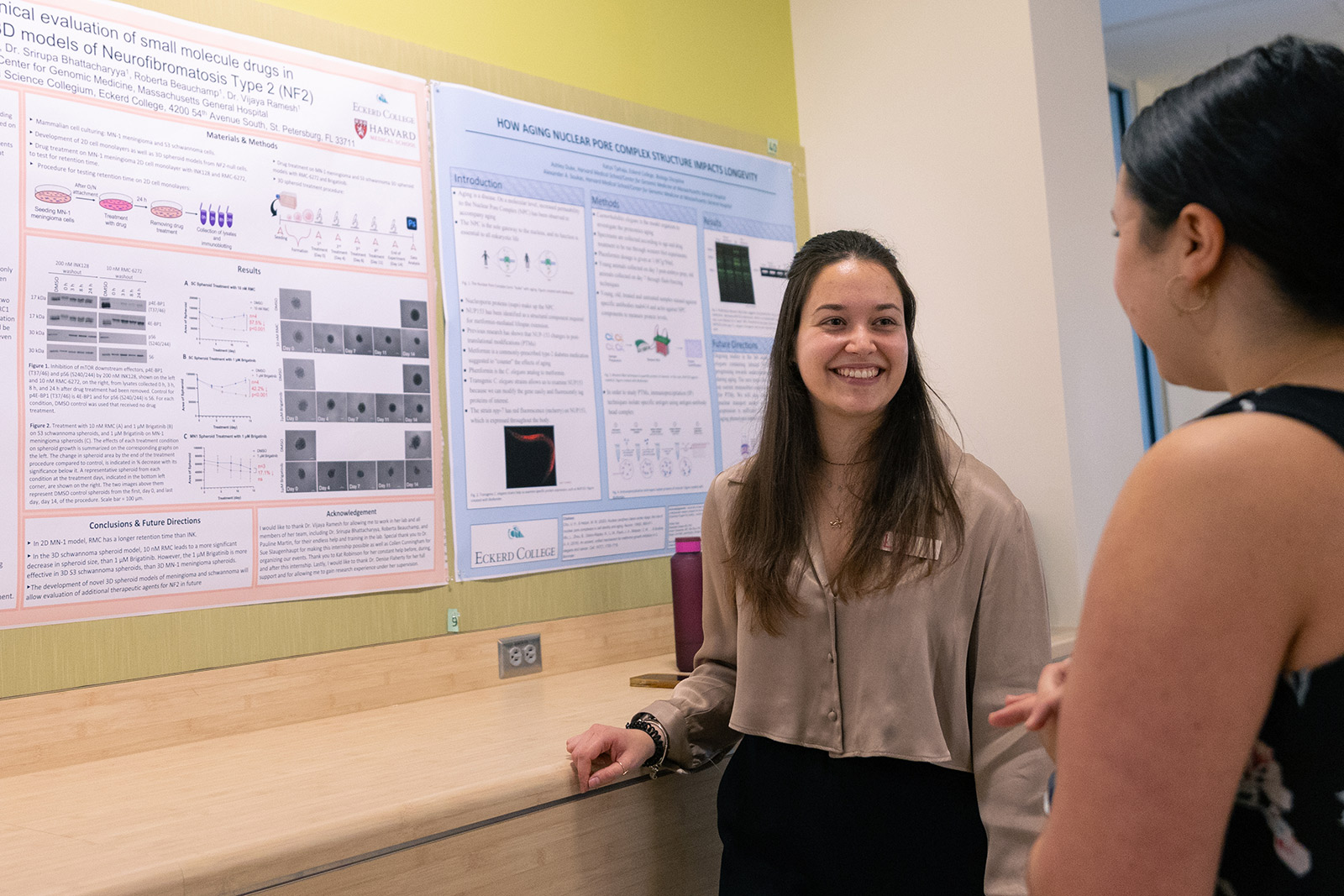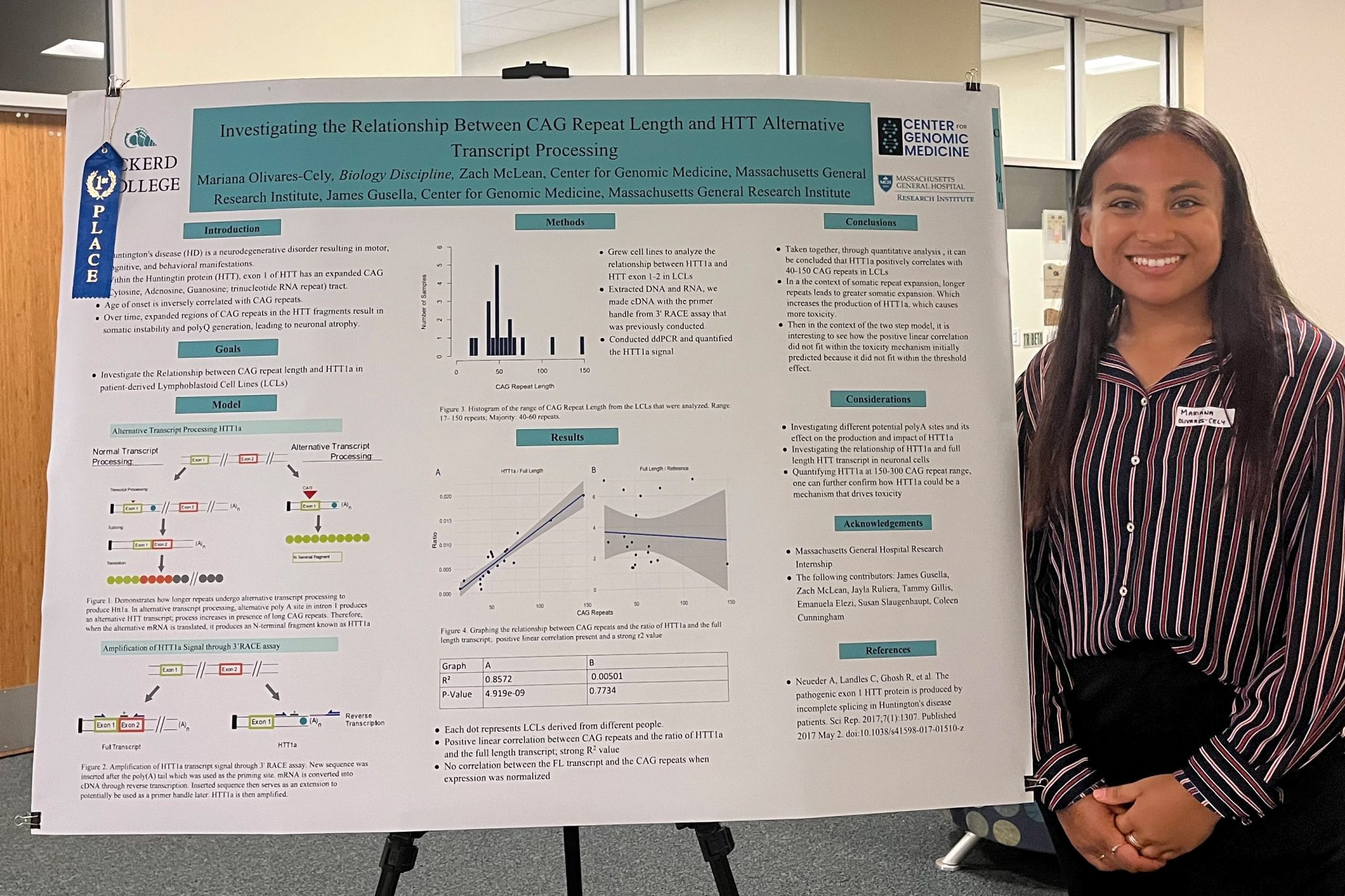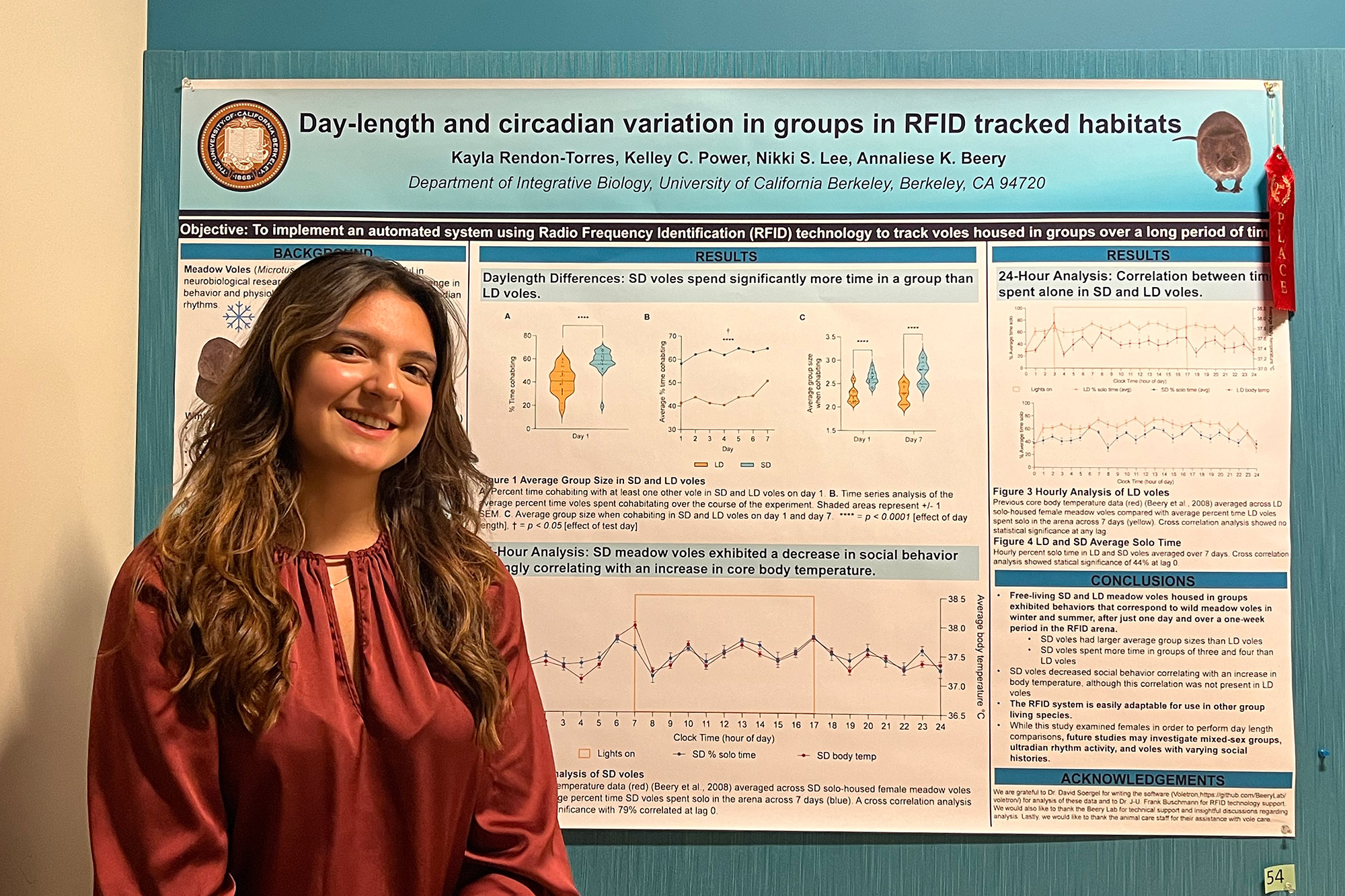Eckerd College senior Lili Kósa began testing noninvasive drug treatments on the gene that leads to central nervous system tumor growth when she was an intern at the Center for Human Genetic Research in Harvard Medical School’s Massachusetts General Hospital Research Institute during her first year.
Lili, an animal studies and biology student from St. Petersburg, Florida, kept at it even after she returned from Boston, and her reward was a first-place win in the disease category of the 17th Annual Eckerd College Student Research Symposium. Her project titled Preclinical Evaluation of Small Molecule Drugs in 2D and 3D Models of Neurofibromatosis Type 2 (NF2) was among nearly 100 student presentations on March 27 in the James Center for Molecular and Life Sciences.
“I hope to one day come back and run more tests. Because of time and resource restraints, I couldn’t go as in-depth as I wanted,” Lili says, “but I want to go into [pharmacology] research, so I know I will be able to revisit this experiment.”
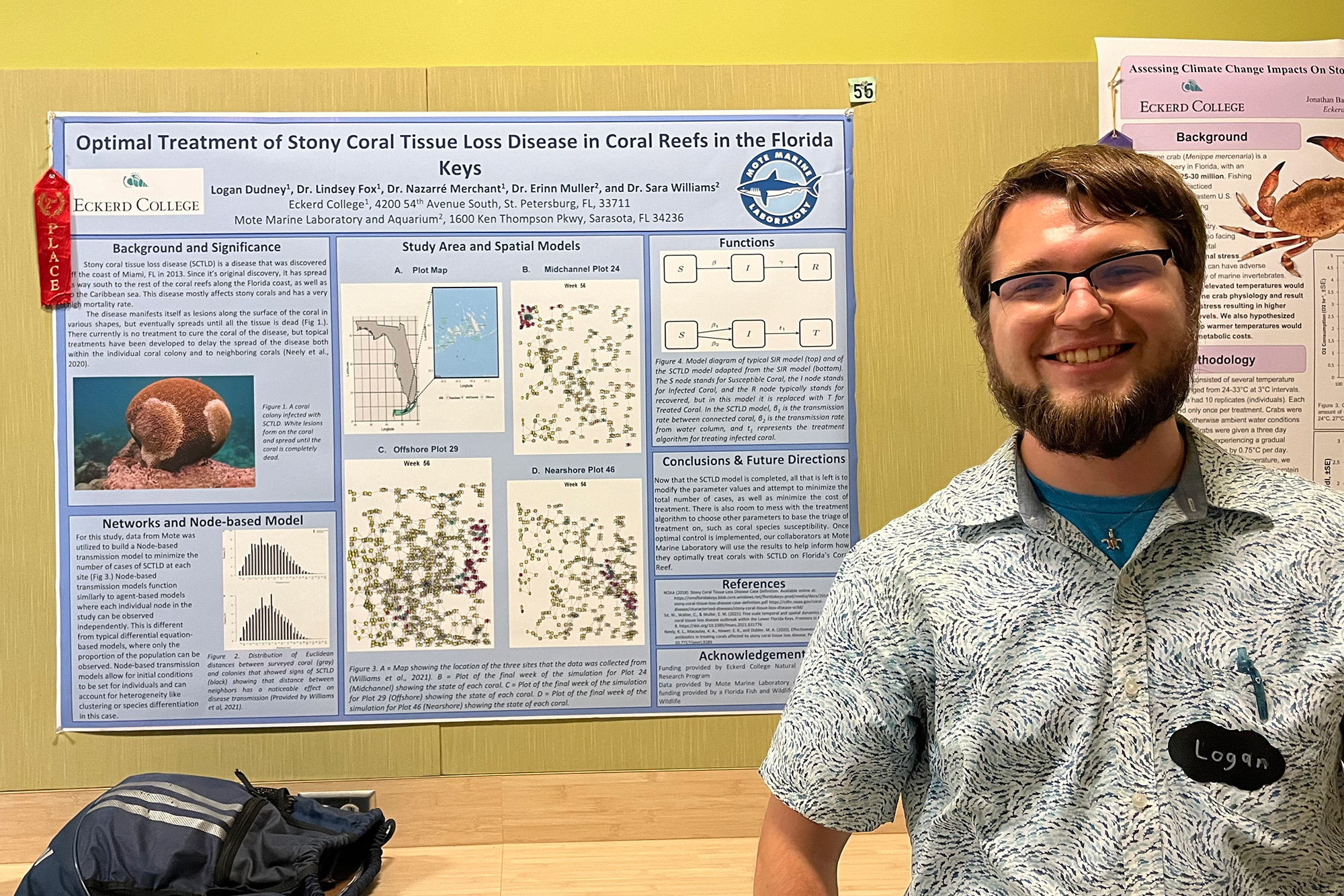
Second-place winner Logan Dudney ’24 studied stony corals for his research presentation. Photo by Ella Glass ’24
The symposium allowed students to showcase their hard work to their mentors and peers for a chance to win first- or second-place honors in one of 10 categories. Professor of Environmental Science and Biology and Richard R. Hallin Professor in Natural Sciences Beth Forys, Ph.D., had volunteered to oversee the symposium in 2021 when COVID-19 regulations made the event virtual.
Since then, she and her team have been in charge of organizing the event.
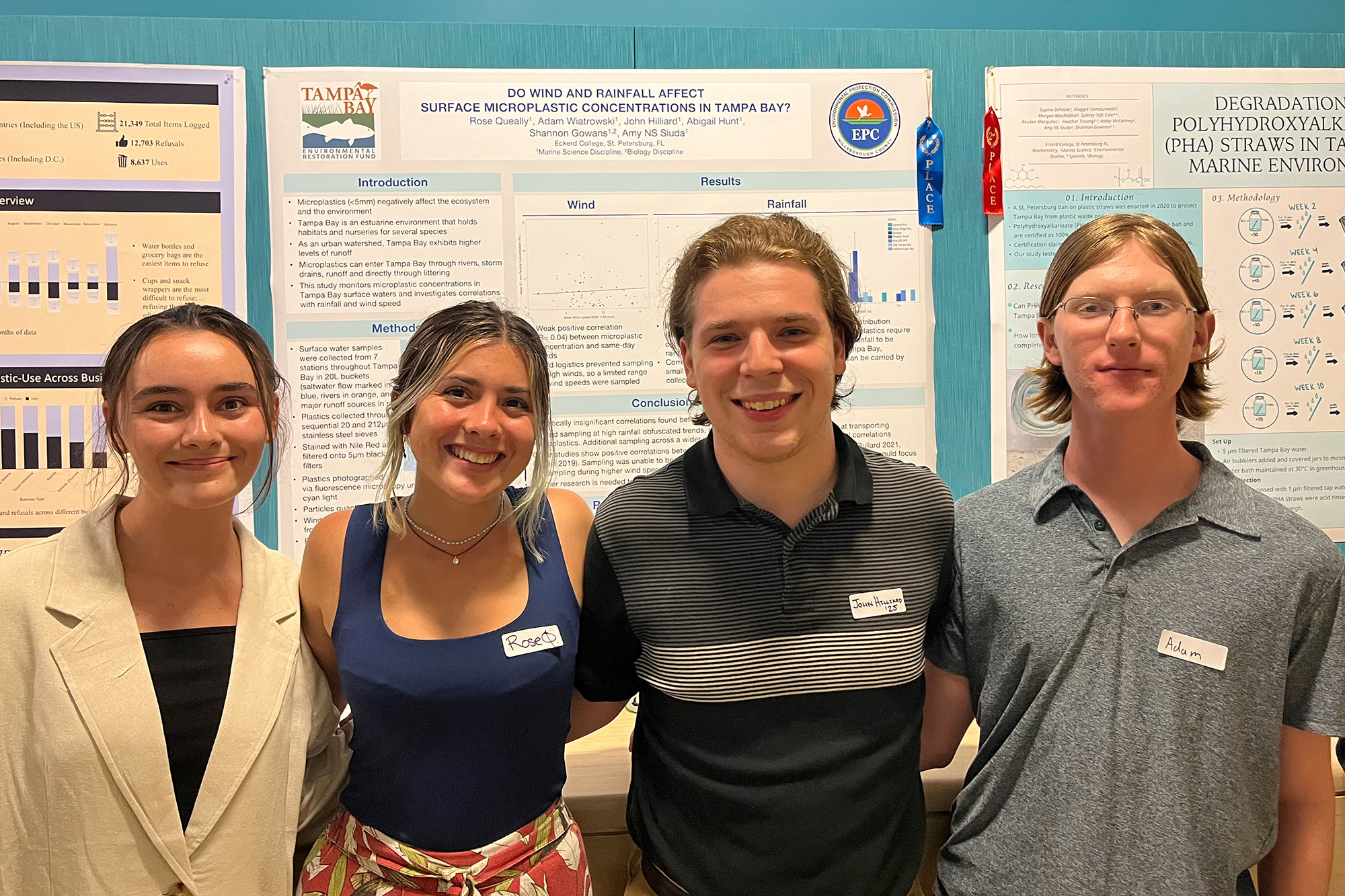
Abigail Hunt ’25, Rose Queally ’24, John Hilliard ’25 and Adam Wiatrowski ’25 researched rain’s effect on microplastics and earned first-place honors in the environmental science category. Photo by Ella Glass ’24
“We have to sort through the applications. There are so many people here at Eckerd, we can only accept the highest quality,” Forys says. This year, more than 200 students contributed to symposium posters.
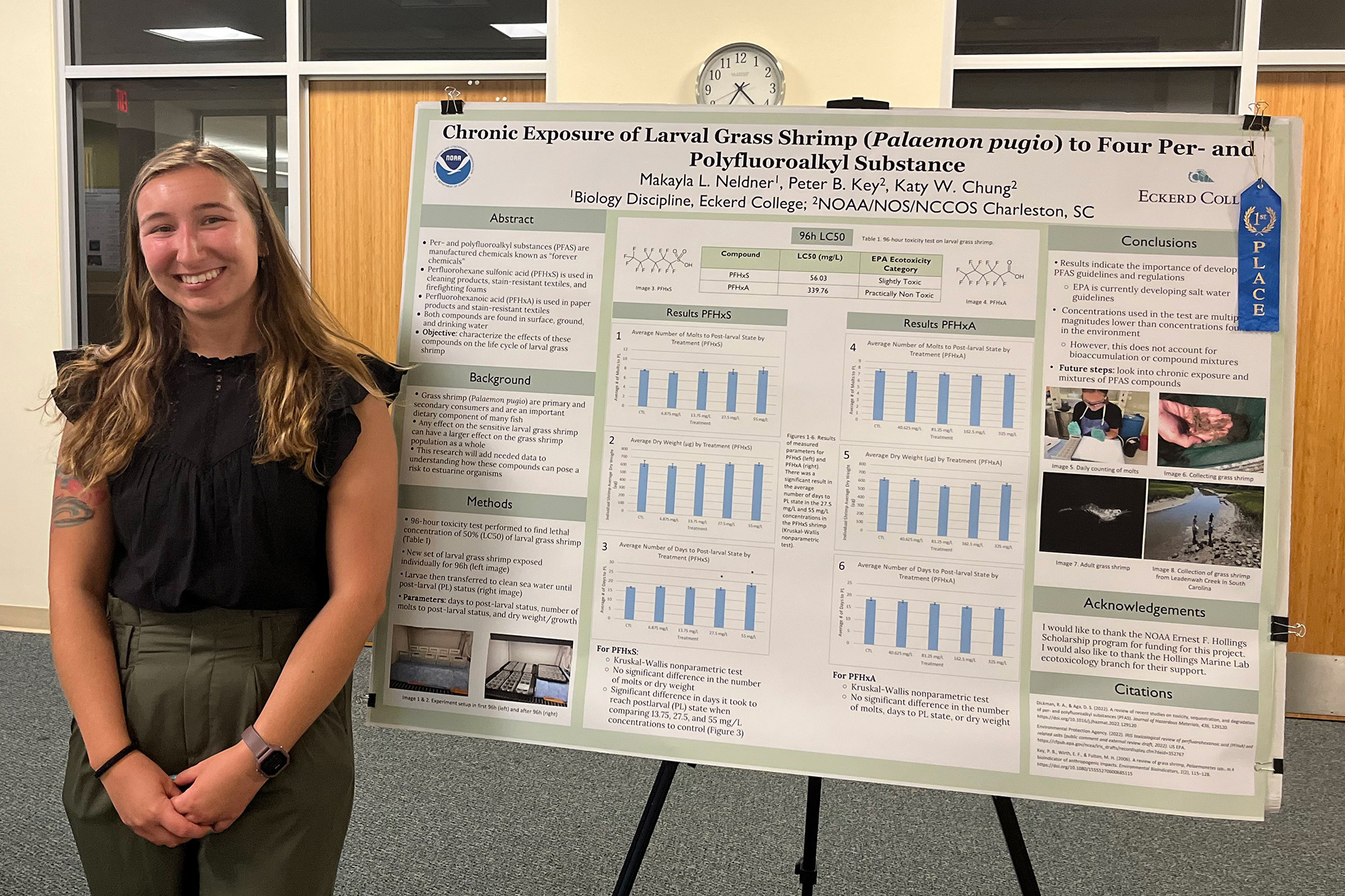
Makayla Neldner ’24 tied for first place in the molecular genetics, cell biology, physiology, neurology category. Photo by Ella Glass ’24
Much of the research presented had been in the works since the participants’ first years at Eckerd. Senior marine science student from Flagstaff, Arizona, Alexsandra Henes, had been thinking about her project since her initial year in Eckerd’s Scientist at Sea program. Her project, Mapping of Modern Sediments in the DeSoto Canyon Region in the Northeast Gulf of Mexico, studied the composition and texture of the sediments with the hopes that the maps can one day help with oil spill management. The detailed work took second place in the geology category.
But not all presenters were seniors. First-Year Research Program members and marine science students Jonathan Ballard and Gillian Smith looked at stone crabs in the study Assessing Climate Change Impacts on Stone Crab Physiology: Temperature Tolerance in Menippe Mercenaria. They hope to help the crabs and the commercial fishing industry by raising the issue of the crabs’ difficulty adapting to warming ocean temperatures. New information might guide fishers to reconsider their sustainability practices. The presentation earned a tie for first place in the Gulf Scholars category.
“We learned a lot,” says Jonathan, who is originally from Pearland, Texas. “We learned how to handle not only the crabs but also equipment, how to not break stuff, and how to talk about our research. That was something we both were a little embarrassed about.”
Most Eckerd College students don’t do research to get awards. Bettering the world for animals, humans and plants is a lofty ideal and guiding principle for many. Senior Connor O’Brien set out to see the impacts of gravel roofs on least terns’ nesting. “I got the idea while talking to Professor Forys about the birds and the problems humans have made for them. Least terns are a threatened species, but hopefully, with information about their nesting patterns, we can help make a brighter future for them,” says Connor, a biology and environmental studies student from Seattle, Washington. “It was very challenging, but that just made the final product so much more rewarding.”
Some students explored the more social side. Hanna Kobs, a junior political science student from Madaba-Manja, Jordan, explored cultural genocide. “Cultural genocide is not recognized in the government,” Hanna says. “I wanted to look into the effects of both cultural genocide and the effects of cultural genocide not being recognized.” She examined different legal mechanisms and documents and possible solutions. “Cultural genocide is a prevalent issue everywhere. I want to go into international law and examine this issue further. Hopefully, I’ll be able to help change it.”
The presentations were judged by a host of Eckerd alumni in various fields, including: Alex Barone ’17, Dr. Tom Battey ’11, Christopher Bauer ’07, Cat Brown ’88, Sarah Bryan Davenport ’17, Rosemary Burkhalter-Castro ’20, Chris Dukes ’13, Dr. Padraic Fitzgerald ’12, Shannon Forshee Fusaro ’12, Emily Freeland ’13, Kayla Hayes ’18, Dr. Rayetta Henderson ’00, Dr. Tessa Hill ’99, Dr. Dominique Lazarre ’06, Dr. Richard McBride ’84, Christian Merkovsky ’16, Dr. Karin Musier-Forsyth ’84, Dr. Ryan Nazar ’07, Dr. Jane Petro ’68, Andrew Shaw ’21, Kiana Sladicki ’17, Ken Tremblay ’18 and Joy Vincent ’18.
See the full list of winners of the 17th Annual Eckerd College Student Research Symposium below.
Animal Behavior
First Place: WILL OCEAN ACIDIFICATION AND ELEVATED TEMPERATURE CHANGE THE SWIMMING BEHAVIOR OF LARVAL STONE CRAB? by Rebecca Meberg, George Xue, Daniel Holstein, Philip Gravinese, Hannah Craft
Second Place: DAY-LENGTH AND CIRCADIAN VARIATION IN GROUPS IN RFID TRACKED HABITATS by Kayla Rendon-Torres, Kelley C. Power, Nikki S. Lee, Annaliese K. Beery
Chemistry, Computer Science, Physics
First Place: TRACKING THE FOOTPRINT OF DRILLING MUDS BY IDENTIFYING BARITE IN SEDIMENTS USING X-RAY DIFFRACTION by Sasha Gitler, Patrick Schwing, Dan Rivera, Gregg Brooks, Kate Murray
Second Place: STABLE CARBON ISOTOPE ANALYSIS FROM BENTHIC FORAMINIFERA IN THE NORTHERN GULF OF MEXICO by Jenna Schell, Patrick Schwing, Bryan O’Malley, Rebekka Larson, Gregg Brooks
Disease
First Place: PRECLINICAL EVALUATION OF SMALL MOLECULE DRUGS IN 2D AND 3D MODELS OF NEUROFIBROMATOSIS TYPE 2 (NF2) by Lili Kósa, Srirupa Bhattacharyya, Roberta Beauchamp, Vijaya Ramesh
Second Place: ENGINEERING PRECISION ADENINE BASE EDITORS by Alexandra Farther, Emily King, Dr. Ben Kleinstiver
Ecology and Evolution
First Place: THE EFFECTS OF BLUE AND GREEN CRAB GRAZING ON EELGRASS TRANSPLANTS IN SAGE LOT POND, WAQUOIT BAY by Abby Kauke, Agustin Moreira-Saporiti, Sarah Merolla, Mirta Teichberg
Second Place: MAMMALIAN HABITAT AND PREDATOR ASSOCIATIONS ON A BARRIER ISLAND COMPLEX by Laura E. Josler, Signe E. Renstrom, Madelyne E. Vashaw, Leo N. Dutkewych, Sarrah E. Bristol, Johnny E. Owens, Finn Topham, Timothy D. Bransford, Elizabeth A. Forys
Environmental Science
First Place: DO WIND AND RAINFALL AFFECT SURFACE MICROPLASTIC CONCENTRATIONS IN TAMPA BAY? by Rose Queally, Adam Wiatrowski, John Hilliard, Abigail Hunt, Shannon Gowans, Amy NS Siuda
Second Place: DEGRADATION OF POLYHYDROXYALKANOATE (PHA) STRAWS IN TAMPA BAY MARINE ENVIRONMENT by Sophie DiPaola, Maggie Tomaszewski, Morgan MacRobbie, Sydney Taft Cole, Reuben Margulies, Heather Truong, Haley McCartney, Dr. Amy Siuda, Dr. Shannon Gowans
Geology
First Place: KINEMATIC ANALYSIS OF LITTLE ELK GRANITE SHEAR ZONES, BLACK HILLS, SOUTH DAKOTA by Liam T. Fry, Laura R. Wetzel, Trevor S. Waldien
Second Place: MAPPING OF MODERN SEDIMENTS IN THE DeSOTO CANYON REGION IN THE NORTHEAST GULF OF MEXICO by Casper Graham, Alexsandra Henes, Rebekka Larson, Gregg Brooks, Patrick Schwing
Humans
First Place: AGEISM AMONG COLLEGE STUDENTS: SHAPING FUTURE GENERATIONS OF OLDER ADULTS by Julia V. Bennet, Tamar E. Shovali
Second Place: WORDS CHANGE THEIR MEANINGS: CONCEPTUALIZING POLITICAL ACTION THROUGH GREEK ANTIQUITY by Izaiah Robbie Rines
Marine Biology
First Place: DOES ACCLIMATION TO ENVIRONMENTAL STRESSORS LEAD TO INCREASED DISEASE RESILIENCE IN A MODEL SEA ANEMONE, AIPTASIA? by Cara DeLacluyse, Dr. Cory Krediet
Second Place: OPTIMAL TREATMENT OF STONY CORAL TISSUE LOSS DISEASE IN CORAL REEFS IN THE FLORIDA KEYS by Logan Dudney, Dr. Lindsey Fox, Dr. Nazarré Merchant, Dr. Erinn Muller, Dr. Sara Williams
Molecular Genetics, Cell Biology, Physiology, Neurology (Tie)
First Place: CHRONIC EXPOSURE OF LARVAL GRASS SHRIMP (PALAEMON PUGIO) TO TWO PER- AND POLYFLUOROALKYL SUBSTANCES by Makayla L. Neldner, Dr. Peter B. Key, Katy W. Chung
First Place: INVESTIGATING THE RELATIONSHIP BETWEEN CAG REPEAT LENGTH AND HTT ALTERNATIVE TRANSCRIPT PROCESSING by Mariana Olivares-Cely, Dr. Crystal Young Erdos, Dr. James Gusella, Dr. Zach McLean
Gulf Scholars (Tie)
First Place: FLORIDA AQUACULTURE: HOW INDUSTRY PROFESSIONALS VIEW CURRENT CHALLENGES AND FUTURE OPPORTUNITIES by Cece Dunham, Liam Moeller, Noelle Boucquey
First Place: ASSESSING CLIMATE CHANGE IMPACTS ON STONE CRAB PHYSIOLOGY: TEMPERATURE TOLERANCE IN MENIPPE MERCENARIA by Jonathan Ballard, Gillian Smith, Dr. Philip Gravinese





